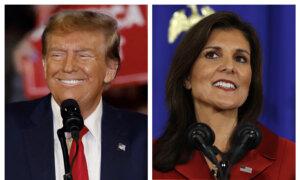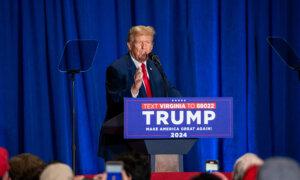Trump is poised to dominate on March 5 as ballots in several states will feature key congressional races in addition to presidential primary contests.
This year, control of Congress also hangs in the balance as slim majorities in the House and Senate present vulnerabilities and opportunities for both parties.
Here’s what to watch for as the votes roll in on Super Tuesday.
Which States Will Vote?
States whose primaries fall on Super Tuesday this year are Alabama, Alaska, Arkansas, California, Colorado, Maine, Massachusetts, Minnesota, North Carolina, Oklahoma, Tennessee, Texas, Utah, Vermont, and Virginia, as well as the territory of American Samoa.
Iowa Democrats will also learn the results of their unprecedented vote-by-mail caucus.
When to Expect Results
6 p.m. EST: Democratic results expected in Iowa.
7 p.m. EST: Polls close in Vermont and Virginia. Republican caucuses convene in Alaska.
7:30 p.m. EST: Polls close in North Carolina.
8 p.m. EST: Polls close in Alabama, Maine, Massachusetts, Oklahoma, and Tennessee. Most polls close in Texas.
8:30 p.m. EST: Polls close in Arkansas.
9 p.m. EST: Polls close in Colorado and Minnesota. Last polls close in Texas. Republican caucuses convene in Utah.
10 p.m. EST: Polls close in Utah (Democrats only).
11 p.m. EST: Polls close in California. Voting is expected to end in Utah (Republicans only).
Midnight EST: Voting ends in Alaska (Republicans only).
Down-Ballot Races to Watch
With the Republican majority in the House hanging by a thread, there are dozens of key congressional races this year that could upset the balance of power in Washington, several of which will hold their primaries on Super Tuesday.
Another key state to watch is Texas, where Republican Rep. Tony Gonzales will need to receive a majority of the votes to fend off multiple primary challengers and avoid a runoff. Meanwhile, Democratic Rep. Sheila Jackson Lee, fresh off her December loss in the Houston mayoral race, faces a tough challenge from former Houston City Councilwoman Amanda Edwards.
Additionally, two South Texas races could be competitive in the fall. While Democrats are eyeing the 15th District seat of Republican Rep. Monica De La Cruz, Republicans have their sights set on the 34th District seat of Democratic Rep. Vincente Gonzalez.
Things could also get interesting in North Carolina. Currently, the state’s 14 congressional seats are evenly split between Republicans and Democrats. But as five of those incumbents—Democratic Reps. Jeff Jackson, Kathy Manning, and Wiley Nickel and Republican Reps. Patrick McHenry and Dan Bishop—have chosen not to seek reelection, November surprises could be in store. And, the District 1 seat of Democratic Rep. Don Davis is another one Republicans are particularly hoping to flip.
The Tar Heel State will also hold its gubernatorial primaries to replace Democratic Gov. Roy Cooper on Super Tuesday. Lt. Gov. Mark Robinson, a Trump-endorsed Republican, currently leads the GOP field for the position, while state Attorney General Josh Stein is the Democratic front-runner. In the coming months, the race could be an indicator of which presidential candidate will snag the swing state’s 16 electoral votes.
‘Uncommitted’ Protest Continues
The “uncommitted” campaign that deprived President Joe Biden of two Democratic delegates in Michigan will head on to Minnesota.
The movement, spearheaded by progressive and Muslim voters, aims to pressure the president into changing his stance on Israel and its ongoing war with Hamas. Organizers, who say he is supporting genocide in Gaza, are specifically calling on him to support a permanent ceasefire in the region.
Although President Biden received more than 623,000 votes—and 115 delegates—in Michigan on Feb. 27, more than 101,000 Democratic primary voters cast their ballots for “uncommitted” instead in a show of defiance. The results shattered the expectations of organizers, who had set the bar low at 10,000 votes.
The two delegates that the campaign picked up are the only ones the president has lost this primary season.
The Minnesota protest is not expected to have the same impact as Michigan’s. But pundits will be watching closely for insight into President Biden’s political strength in the state, which is home to roughly 250,000 Muslim Americans.
Other Super Tuesday states expected to participate in the protest include Colorado and North Carolina.
Will Trump Clinch the GOP Nomination on Super Tuesday?
Even if former President Donald Trump wins all available Republican delegates on Super Tuesday, he will still fall short of the 1,215 needed to secure the party’s nomination for president.
Haley’s Political Future
Facing increasing questions about her continued presence in the race, Ms. Haley told NBC’s “Meet the Press” on March 3 that she would keep going for as long as she remains “competitive.”
“As long as we are competitive, as long as we are showing that there is a place for us, I’m going to continue to fight,” she said, without specifying what, exactly, that would look like for her.
When pressed on whether she still saw a path to the nomination for herself, the former U.N. ambassador noted that the bulk of the primary contests have yet to play out.
“You’re going to have 16 states and territories that are voting on Tuesday, and so a lot of people’s voices are going to be heard. And that’s what this has all been about,” Ms. Haley said.
“We’ve only had three or four states that have voted up until now. We’re a big country, and we want everybody to feel like they had the opportunity to vote for someone and not just against someone. And I think that’s the biggest thing we hear is people are so desperate for normal. And that’s what we want to give them is normal.”
The candidate also said she did not feel bound by the pledge she made to the Republican National Committee to support the party’s eventual nominee.
Ms. Haley noted that she had to sign the pledge to secure a spot on the GOP primary debate stage but added, “The RNC is now not the same RNC. Now it’s Trump’s daughter-in-law.”
RNC Chairwoman Ronna McDaniel has announced that she will step down from her post on March 8. President Trump has backed North Carolina GOP Chair Michael Whatley to replace her and Lara Trump, his daughter-in-law, for co-chair.
If Ms. Haley should eventually drop out of the race and renege on her pledge, the consequences could not only be legal but also political.
Some voters have already been turned off by her attacks on President Trump’s age and her decision to stay in the race. If she were to launch a third-party bid or otherwise withhold her support from him as the nominee, she could lose further support.
But Ms. Haley told NBC that the future is not something she’s thinking about right now.
“I don’t look too far ahead. I look at what do the American people want. If 70 percent of Americans say they don’t want Donald Trump or Joe Biden, that’s not a small number. If 30 to 40 percent of all these early states have said they want to vote for the direction of where we want to take the country, that’s not a small number. And so that’s why we continue to push forward.”
The Associated Press contributed to this report.
Original News Source Link – Epoch Times
Running For Office? Conservative Campaign Consulting – Election Day Strategies!


